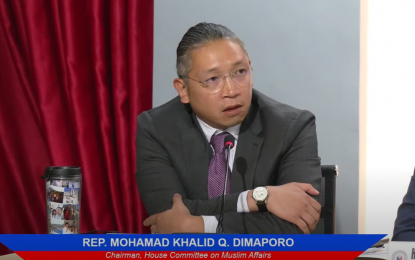
Lanao del Norte Rep. Mohamad Khalid Dimaporo (File photo)
MANILA – A lawmaker on Tuesday suggested classifying the use of deepfake technology that threatens national security as a form of terrorism.
In a press conference, Lanao del Norte Rep. Mohamad Khalid Dimaporo said the deepfake content that made President Ferdinand R. Marcos Jr. appear like he is asking the Armed Forces to act against another country is a "sabotage" of the President's foreign policy.
Deepfakes are an advanced form of digital content manipulation using generative AI or artificial intelligence.
“It just shows how desperate the opposition is against our president, President Bongbong Marcos, because he is doing a spectacular job in managing our foreign policy to the point that they try to sabotage him and that’s why I feel this should not be taken lightly,” Dimaporo said.
Given the seriousness of the issue, Dimaporo said he would seek guidance from Speaker Martin Romualdez and suggest the possibility of amending laws to classify such behavior of leveraging deepfake technology as a form of terrorism.
“If there’s a need to amend our laws and declare this type of behavior as a form of terrorism, well then we will refer to our leader here in Congress, our Speaker Martin Romualdez,” he said.
1-RIDER Party-list Rep. Rodge Gutierrez warned the deepfake featuring the President poses significant risks to national security and could lead to international conflict.
“We can assume siguro (maybe) that this is politics, fine, granted. Pero (But) the politics that they are now playing is treading a fine line with national security concerns,” Gutierrez said. “This is a very dangerous prospect. So, I think we really have to take this seriously."
Lanao del Sur Rep. Zia Alonto Adiong, for his part, said the deepfake content is an effort to spread disinformation and divert attention from important issues.
Adiong noted the importance of the President's foreign policy choices, which not only reinforce partnerships with enduring allies but also symbolize the administration's commitment to addressing genuine concerns.
Adiong criticized those behind the cyber manipulation attack for their disregard for truth and their willingness to manipulate narratives for their own agenda.
“Iyong ganitong klaseng mga tao (These types of people are) not only sabotaging the President but it disrespects each and every individual Filipino," he said.
PCO Assistant Secretary Patricia Kayle Martin earlier said the government was exploring legal action against those who created the deepfake content of the President.
Martin said the Department of Information and Communications Technology and National Security Council were investigating the issue, noting that these deepfake videos using President Marcos’ face and voice have since been taken down.
She urged the public to stop the spread of deepfakes and fake news on social media, as it may lead to serious repercussions and endanger the country’s foreign relations and national security.
“Actually, di ba ang dati po ang problema natin mga— may makikita tayo sa social media na mga quote cards or mga memes lang, ngayon iba na. Pati kasi ‘yung boses meron na. So, talagang mahalaga na tigilan ‘yung ganitong uri ng fake news dahil may potential itong magdulot ng malubhang pinsala sa ating foreign relations and national security (The problem before in social media was just limited to quote cards and memes, but now things have changed. Even audio [deepfakes] can be generated. So it is really important to fight this kind of fake news because it has a potential to harm foreign relations and undermine national security,” she said.
She said the government has partnered up with big social media platforms like Google, TikTok, and Meta—which is Facebook, Instagram and X -- to fight these online threats.
These platforms are PCO’s partners in its Media and Information Literacy Campaign.
An investigation by the Cybercrime Investigation and Coordinating Center into the deepfake content is pointing at an individual source, not an attack from a foreign country. (PNA)
